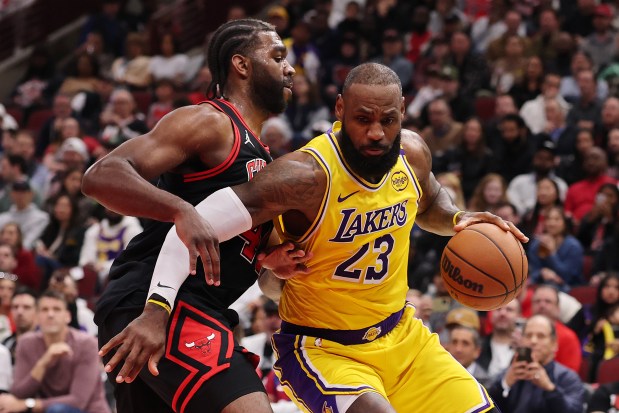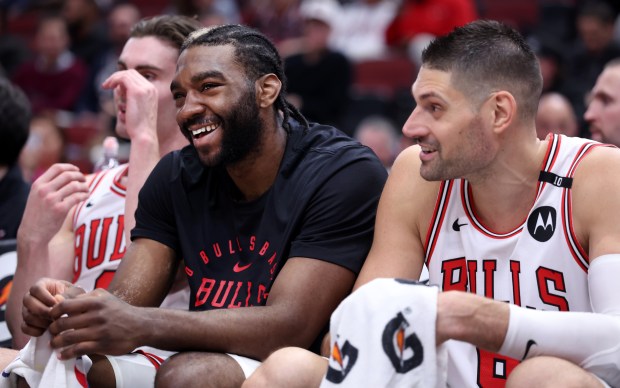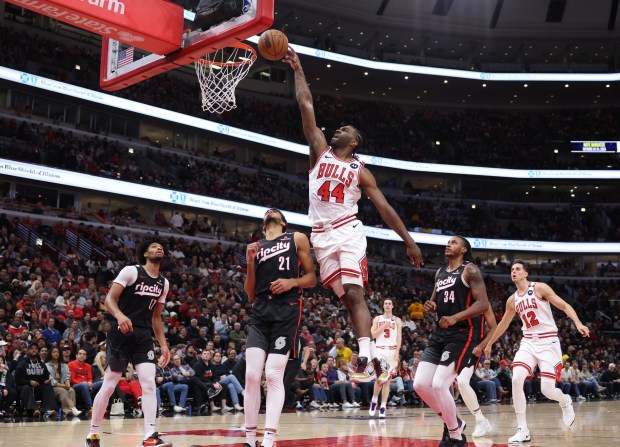Patrick Williams knows he can change any game for the Bulls.
It’s been an emphasis for his entire career in Chicago. Williams, 23, has always had an X factor effect — not just because of his potential, but also due to his unpredictability.
Things are different this season. As the Bulls prepare for a third consecutive play-in tournament, Williams has never had a smaller role. He’s no longer a starter and rarely closes. But that doesn’t matter to Williams, who still sees himself as a crucial piece to future success for the Bulls.
“This group has a really good chance to do something,” Williams told the Tribune. “And in a lot of ways, that’s going to be predicated on how I play. I don’t think it’s any secret that when I play well, we play better.”
This hasn’t been the season Williams envisioned for himself. And it’s not the first time that’s been true. Most of his short NBA career has been a stop-and-start cycle of hope and disappointment.
At first, there was a reason. Two major injuries — a wrist surgery that derailed his second season, a foot surgery that ended last season early — set his development back significantly. Through each recovery process, Williams learned to embrace patience.
“It felt pretty clear to me early on that my development was going to be a little bit different,” Williams said. “But you learn what you can while you can.”
But at the end of the season, Williams is still stuck in the same confusing place. He lost his starting job to rookie Matas Buzelis. His 3-point shooting plummeted. His confidence on the ball has been visibly shaken, his once-resilient defense diminished by his smaller role in the secondary rotation.
Williams is in no-man’s-land with the Bulls. He’s almost finished the first year of a five-year, $90 million deal. It’s a contract that many Bulls fans have come to resent, as the forward still struggles to deliver on the hefty expectations of his former lottery pick selection.
At that price, Williams isn’t going anywhere. But he also isn’t visibly improving for the Bulls, a team that has seen significant payoffs from the development of other young players like Coby White and Ayo Dosunmu.
But even amid these clear stumbling blocks, it’s hard to shake the positivity that Williams tries to imbue into his daily routine with the Bulls.
“It’s been a learning experience all this season,” Williams said. “But I’ve loved it.”
All of it? Getting benched? Struggling to deliver on expectations?
Williams says yes.
He knows there’s an aspect of disappointment to his performance. That’s why he stays off social media and tries to ignore the discourse surrounding his own play. But when Williams just focuses on the work itself, he swears that this season has been rewarding — even through failure and frustration.
“This part of the process is the most fun,” Williams said. “It’s the only way to get better. Going through things pushes you to a different mindset, to different levels you might not have gotten to if you didn’t have to go through things.”

The problem Williams faces is unique. It’s not a matter of physical inability. At 6-foot-7 and 215 pounds, he’s tall enough, strong enough and skilled enough to be a genuinely impactful player in the NBA. But for Williams, the puzzle to solve has always been mental.
This has been a project for coach Billy Donovan since Williams first arrived in Chicago. Donovan is a mentality-first coach with a penchant for self-help study and a deep Rolodex of motivational speakers he routinely taps in to speak with his players.
Over the past four seasons, Williams has spoken with Dr. Wendy Borlabi, the team’s director of performance and mental health. Donovan also brought in Dr. Kevin Elko — a mindset coach who specializes in sports performance — to talk to Williams.
Donovan still isn’t fully certain what he’s trying to tap into in Williams. He wants the forward to play with less fear and more aggression. Most of all, Donovan is trying to push Williams out of different comfort zones — like his midrange shot, a favorite of Williams on offense.
Here’s the thing about that midrange jumper: it’s not a bad shot. But Williams shot only 33% on his favored midrange attempts this season. He is much stronger at the rim — and even from behind the 3-point arc, where he shoots 34.3% — despite his preference for those spot-up jumpers.
Donovan has spent the better part of five years trying to convince Williams of this statistical truth. He urges the forward to not pull up at the first sign of contact, to lower his shoulder and use his physicality to force shots at the rim. It still hasn’t gotten through.
Talking through the play-in tournament this Monday, Williams clearly understood the postseason stakes for the Bulls. He knew they would be challenged by the way that teams slow down in the postseason, a natural shift that could undermine the way the Bulls dominate with their fast-paced, full-court style of play.
But he also emphasized one desire for unlocking himself in the postseason: “Me in my midrange, you’ll probably see a lot more of that.”
It doesn’t matter how many times he’s told — or shown — that the shot doesn’t work. Williams always wants to revert to what’s most comfortable.
This disconnect is a consistent frustration for Donovan — and a source of Williams’ inconsistency. Even when things go well, the forward still doesn’t seem to understand the formula for improving his own game.

Williams is a player defined by highs and lows. In Sunday’s win over the Charlotte Hornets, he showcased how he can maximize this reserve role to make a crucial impact for a Bulls team that lacks depth. But four games prior, he could barely keep himself on the court in a loss to the Dallas Mavericks, missing all three of his shots while turning the ball over three times.
The next day, Donovan pulled Williams aside. He felt Williams seemed out of sorts, playing overly tentatively as if he was uncomfortable in his role. And if he was being honest, Donovan couldn’t tell if Williams was even enjoying basketball anymore.
The forward just brushed it off.
“It’s never fun after a loss,” Williams said with a shrug.
This has always been the challenge with Williams. On the outside, he appears unflappable, maybe even to a fault. But internally, Williams is hard on himself, also to a fault. Sometimes, enough to throw off his game.
Even at a critical crux of the season, it’s difficult for Donovan to fully identify how Williams is handling another underwhelming year.
‘‘I don’t necessarily have a great answer on where he is mentally,” Donovan said. “One of the things that he’s battled with is where he’s the harshest critic of himself on the court. I think his rookie year it was a major problem.’’
Over the years, Williams has tried to calm the paralyzing effects of his self-criticism. He’s learned ways to create more consistency in his mindset. Taking encouragement from incremental gains. Finding joy in the work. Trusting that he can still make an impact.
And for the Bulls — whose margin for error couldn’t be slimmer — the potential for Williams’ improvement has never been more important.
“I always say that the only way out is through,” Williams said. “If you lean into that and you try to learn as much as you can, it’s not always gonna be pretty now, but it’s gonna be fun trying to learn as much as you can throughout the process. And it’s not gonna storm forever.”



